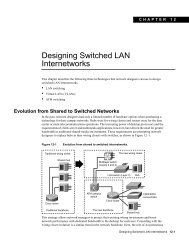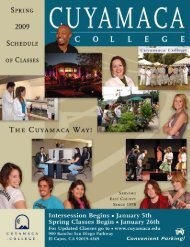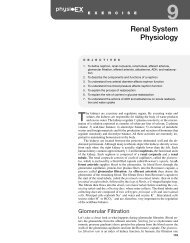SKILL PANEL REPORT California's Water Industry - Cuyamaca ...
SKILL PANEL REPORT California's Water Industry - Cuyamaca ...
SKILL PANEL REPORT California's Water Industry - Cuyamaca ...
You also want an ePaper? Increase the reach of your titles
YUMPU automatically turns print PDFs into web optimized ePapers that Google loves.
<strong>SKILL</strong> <strong>PANEL</strong> <strong>REPORT</strong> California’s <strong>Water</strong> <strong>Industry</strong>The panel’s recommendation is to explore opportunities for hands-on technicaltraining programs. Panelists from community colleges see this as a bridge toemployment for students, but acknowledge that colleges do not have funding forthe facilities and equipment needed for hands-on training. “This is a hugeproblem and I would like the report to reflect the lack of apprenticeships,” saidpanelist Corine Doughty. Panelists from the water industry pointed out that waterand wastewater agencies vary; some prefer to hire entry level workers and trainthem in-house while others prefer to hire journey level workers.How do we learn best?73% of panelists said“Show Me”One model is offered by <strong>Cuyamaca</strong> and Palomar Colleges: a six year oldinternship program with the 24 water and wastewater agencies in the San Diegoregion. The 33 week program includes orientation and four 8-week modules --hands-on time in system operations, system maintenance, water treatment andwastewater treatment. Participants are selected through an interview processand must maintain at least a “C” average in the accompanying classwork. So far,42 of the 57 graduates have been hired.Metropolitan <strong>Water</strong> District of Southern California, Los Angeles Department of<strong>Water</strong> and Power and the San Francisco Public Utilities Commission haveapprenticeships, too, because of their large size and large unions. Panelist GenePatricio manages the Apprentice and Technical Training Unit at Metropolitan<strong>Water</strong> District of Southern California. While Metropolitan prefers to develop itsown workers in its own facilities, Patricio acknowledged that finding qualifiedtrainers is difficult and that the district is scaling back the program. “There couldbe a centralized apprenticeship program,” he said, and then asked, “Can theagencies come to an agreement?”The question is whether skill panels make water industry apprenticeshippossible, and the answer appears to be yes. By bringing employers, educationand workforce investment boards together at the regional level, skill panelsprovide the collaboration, management team and access to funding needed.Regional skill panels also give small utilities access to training on a larger scale.The panel’s recommendation is to follow up with a cost benefit analysis ofimmersion, facility based and blended learning models.Promising, too, is that the California Community Colleges support apprenticeshipprograms throughout the state: approximately 25,000 apprentices are enrolled inover 160 programs at 39 campuses. 17 Each apprenticeship program is apartnership between an employer and the California Community Colleges or theCalifornia Department of Education, and apprentices learn on the job during theday and attend college in the evening for Related and Supplemental Instruction(RSI) selected by the employer. Allowing regional skill panels to utilize thissuccessful model and partner with the California Community Colleges to fundapprenticeship programs would be an exciting next step. Perhaps the DoingWhat Matters initiative is the vehicle to make this happen.24
















